Finding Your Role: How Working with a Team Building Specialist Enhances Team Culture
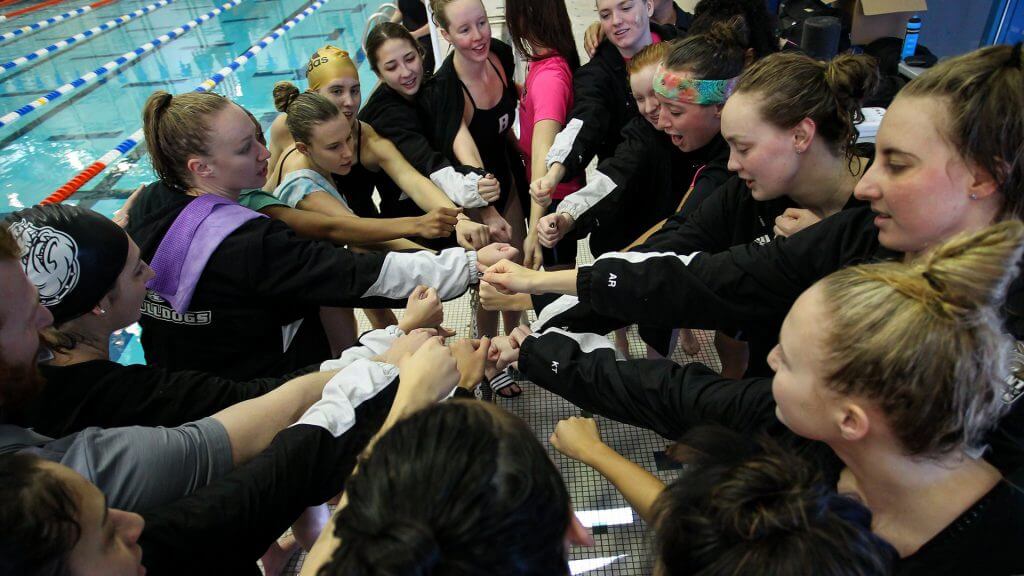
By Claire Russell, A Swimming World College Intern.
Behind every successful team, group or workplace is a combination of individual and unique personalities that work together to accomplish amazing things. Every team – regardless of the level – seems to have these four personalities: the loud leaders, the silent stars, the natural talents and the social butterflies. One personality type has not been found to necessarily be more athletic than the others, and many of us have found ourselves more annoyed with a certain personality than others throughout the years.
However, it is important to recognize that every person has a crucial role on the team. No matter if you are the fastest, slowest, loudest, sweetest or smartest on the team, you are just as important as the other. The social butterflies make the loud leaders better. The natural talents push the silent stars one step higher. The teams that find a way to acknowledge the differences and truly appreciate and embrace each athlete’s unique role are the lucky ones that find that magic formula for success.
It all starts with knowing who you are…
Recognizing Your Role and What You Can Bring To the Team
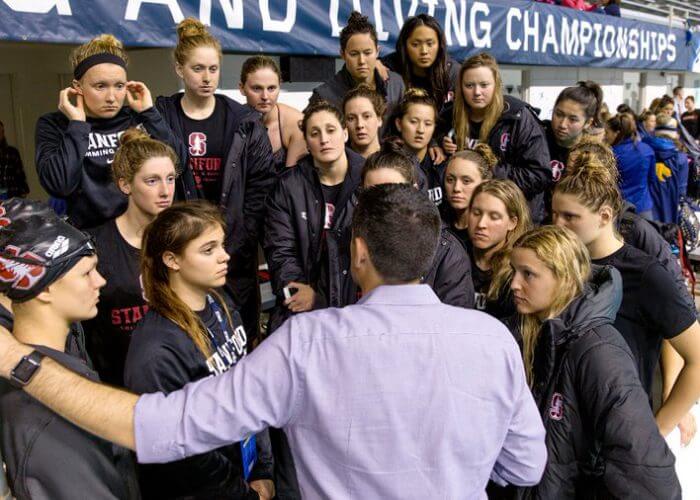
Photo Courtesy: Twitter, @stanfordwswim
Reflect on these questions: What about your personality, work ethic, or character enhances the team? How do you think others would describe you? With such little time in a demanding schedule, it’s sometimes hard to identify what each person brings to the table. Many swim teams incorporate team bonding activities that can potentially teach each member to understand their role within and importance of the team as a whole.
The teams that win are typically the ones with a wide range of personality types that work together. We all have unique gifts, but we have to find time to understand ourselves and use them to our advantage.
Bryant University Swimming and Diving Team Bonding Experience
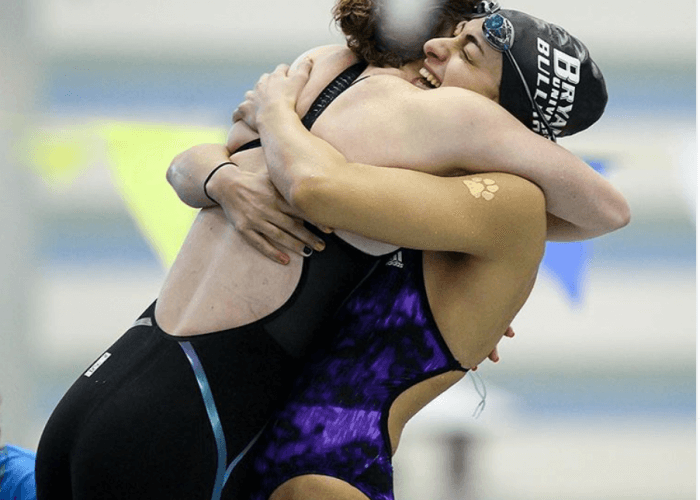
Photo Courtesy: Instagram, @bryantswimdive
Bryant University has taken team bonding to the next level and implemented time dedicated towards finding their personality and role. The team even worked with a team bonding specialist and behavior analyst during a team bonding activity to help their swimmers understand how their natural behavior impacts their team. In the team bonding activity, the swimmers took a test to figure out what behavior they have and give off to their teammates. Most were shocked with the results. With this knowledge, they were able to understand themselves first before they can start understanding their teammates.
Bryant University’s Swim and Dive head coach, Katie Cameron, shares how beneficial the experience was:
“Bringing in a team building specialist like Susan Teeter was a no-brainer for us. She opened our eyes to new concepts and ways of thinking. It helped us realize that it’s important to remember that everyone is an individual and must be managed differently while maintaining a team-first culture. Every member of the team comes to campus with different life experiences. Then, we have to mesh them all together to make a true team.”
The Impact of Knowing Your Role
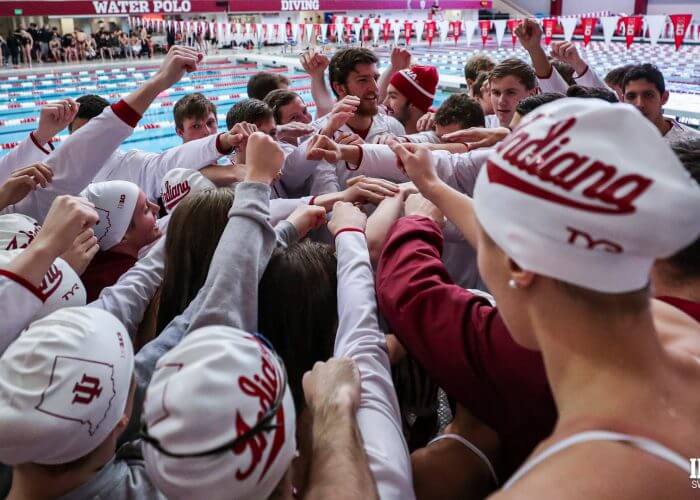
Photo Courtesy: Twitter, @IndianaSwimDive
Two team captains of the team confirmed how helpful the experience was. Alyssa DiFiore and Lindsey Choate were captains of the 2018-19 season and are re-elected for the upcoming 2019-2020 season. They will be joined by Alaina Scifo and Meg Veenstra in leadership next season. Choate reveals how understanding your role helps with communication:
“Understanding my own personality definitely made it easier for me to understand others. Communication is a critical part of any team’s success. Understanding how to interact and communicate with my teammates is also extremely important. Being confident in your role and understanding others will help drive the overall communication on the team.”
DiFiore recalls a time in season after bonding when she noticed swimmers with different roles on the team working together to help solve a common issue. She shares:
“I can remember situations where a teammate was having a hard time and not performing as well as they would like to. Someone with a more talkative personality was able to get the struggling swimmer’s mind off things when they needed a distraction. Someone who was more down-to-earth was able to help them stay rational and remember the big picture. It takes a village to raise a successful team. It takes every single person.”
Final Thoughts
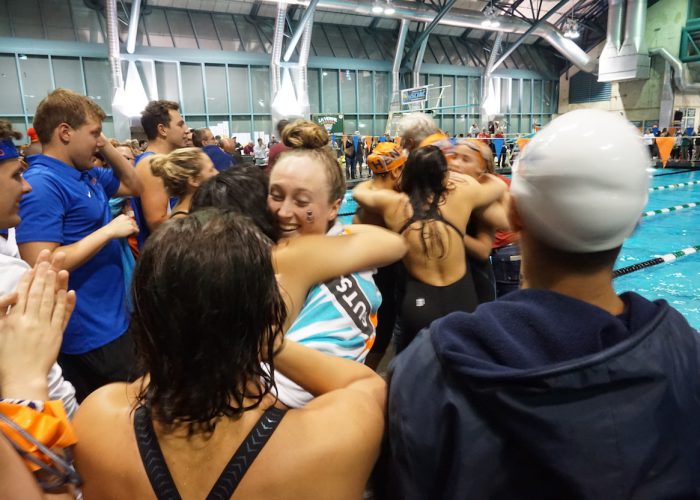
Photo Courtesy: Young Kim
The important take-away is that everyone has a role and is essential to the success of the team. Sometimes we are the ones who give our teammates a pep talk before a race, even though we are in their heat. Sometimes we are the ones swimming the “worst event” at conference because the faster girls want to save their energy for relays. Other times, we’re cracking jokes when someone is really stressed to help them relax or staying up late to help a teammate with homework.
We all have a role. We all have strengths. The most important role we can play for our team is to use our strengths to grow your team as a whole. Regardless of the scoreboard, we are all equally important to the success of our team.
-All commentaries are the opinion of the author and do not necessarily reflect the views of Swimming World Magazine nor its staff.




Love how your article makes everyone feel like they are an important contributor to a team!! Well done!!
As a coach, I find that when people feel like they don’t contribute to the team score at championships, they don’t belong. That couldn’t be further from the truth! Way to hit on why!
Great article. Love Bryant! Go Bulldogs ?
Great ideas! I’ll have to share this with my swimmers at home. This will give them a great new perspective.
Great article! I think this is something a lot of teams forget!!
Great article!
Love that you explained how important everyone is on the team!
AM
Great article! I have been managing professional teams for over 20 years and what you have outlined is so on target.
We all have our strengths and weaknesses. As a team, is important to equally recognize what they are in ourselves as well as others, to achieve the best possible outcomes for all involved. The following are a few additional key elements:
Listening
Communicating
Encouraging
Understanding and recognizing others talents
Understanding and recognizing others differences, approach and contributions to the team
Respecting yourself, as well as others